一般疑问句和特殊疑问句 巩固练习
(完整版)一般疑问句和特殊疑问句专项练习
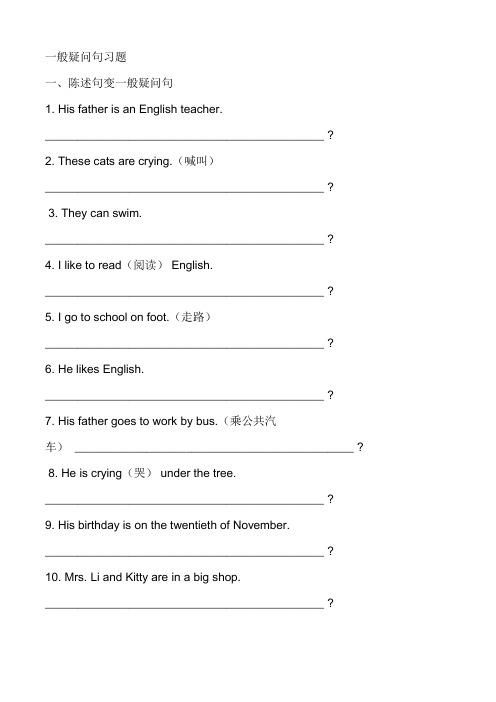
一般疑问句习题一、陈述句变一般疑问句1. His father is an English teacher.___________________________________________ ?2. These cats are crying.(喊叫)___________________________________________ ?3. They can swim.___________________________________________ ?4. I like to read(阅读) English.___________________________________________ ?5. I go to school on foot.(走路)___________________________________________ ?6. He likes English.___________________________________________ ?7. His father goes to work by bus.(乘公共汽车) ___________________________________________ ?8. He is crying(哭) under the tree.___________________________________________ ?9. His birthday is on the twentieth of November.___________________________________________ ? 10. Mrs. Li and Kitty are in a big shop.___________________________________________ ?11. Kitty is wearing her new uniform.___________________________________________ ?12. The boy under the tree(树) is hungry.(饥饿)___________________________________________ ?13. He goes to school every day.___________________________________________ ?14. I want to have a model car(摩托车).___________________________________________ ?15. She wants a cup(杯) of coffee(咖啡).___________________________________________ ?16. Mrs. Li and Kitty watch TV at night(在晚上). ___________________________________________ ?17. I do my homework(家庭作业) after(在……之后) school. ___________________________________________ ?18. Everybody is in the classroom.___________________________________________ ?19. The boy does some housework at home___________________________________________ ?20. The children had a good time in the park.___________________________________________ ?二、把肯定句变为否定句1. His father is an English teacher.____________________________________________.2. These cats are crying.(喊叫)____________________________________________.3. They can swim.____________________________________________.4. I like to read(阅读) English.____________________________________________.5. I go to school on foot.(走路)_______________________________________________ .6. He likes English._______________________________________________ .7. His father goes to work by bus.(乘公共汽车)_______________________________________________ .8. He is crying(哭) under the tree._______________________________________________ .9. His birthday is on the twentieth of November._______________________________________________ .10. Mrs. Li and Kitty are in a big shop._______________________________________________ .11. Kitty is wearing her new uniform.___________________________________________ .12. Tom has some apples.___________________________________________ .13. He goes to school every day.___________________________________________ .14. I want to have a model car(摩托车).___________________________________________ .15. She wants a cup(杯) of coffee(咖啡).___________________________________________ .16. Mrs. Li and Kitty watch TV at night.___________________________________________ .17. I do my homework(家庭作业) after(在……之后) school.___________________________________________ .18. Everybody is in the classroom.___________________________________________ .19. The boy does some housework at home.___________________________________________ .20. The children had a good time in the park_________________________________________________________ . 三、作肯定和否定回答1、Is this your pencil-case?肯定回答:___________________.否定回答:___________________.2、Is that his backpack? 肯定回答:___________________.否定回答:___________________.3、Are these her brothers?肯定回答:___________________.否定回答:___________________.4、Are those Tom’s parents?肯定回答:___________________.否定回答:___________________.5、Can you play the guitar?肯定回答:___________________.否定回答:___________________.6、Is this your sister?肯定回答:___________________.否定回答:___________________.7、Is this my pen?肯定回答:___________________.否定回答:___________________.8、Do you all(都、全部) at school?肯定回答:___________________.否定回答:___________________.9、Do they like French fries?肯定回答:___________________. 否定回答:___________________. 10、Does he like pears?肯定回答:___________________. 否定回答:___________________. 11、Is that a Chinese car.肯定回答:___________________. 否定回答:___________________. 12、Can you dance?肯定回答:___________________否定回答:___________________. 13、Can you paint?肯定回答:___________________.否定回答:___________________. 14、Can she speak English?肯定回答:___________________ . 否定回答:___________________. 15、Can you speak Chinese?肯定回答:___________________ . 否定回答:___________________.16、Can he play chess?肯定回答:___________________.否定回答:___________________.17、May I ask your question?肯定回答:___________________.否定回答:___________________.18、Do you like salad?肯定回答:___________________.否定回答:___________________.19、Is he your father?肯定回答:___________________.否定回答:___________________.20、Are you from China.肯定回答:___________________.否定回答:___________________.特殊疑问句习题根据句意,用特殊疑问词来完成句子。
英语一般疑问句和特殊疑问句专项训练
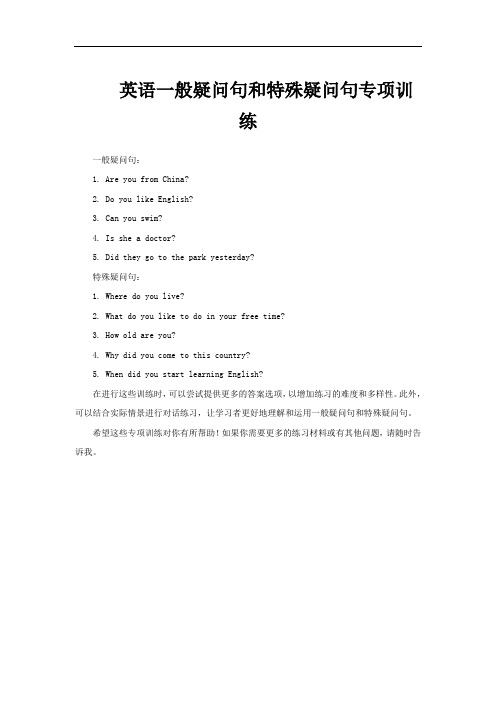
英语一般疑问句和特殊疑问句专项训
练
一般疑问句:
1. Are you from China?
2. Do you like English?
3. Can you swim?
4. Is she a doctor?
5. Did they go to the park yesterday?
特殊疑问句:
1. Where do you live?
2. What do you like to do in your free time?
3. How old are you?
4. Why did you come to this country?
5. When did you start learning English?
在进行这些训练时,可以尝试提供更多的答案选项,以增加练习的难度和多样性。
此外,可以结合实际情景进行对话练习,让学习者更好地理解和运用一般疑问句和特殊疑问句。
希望这些专项训练对你有所帮助!如果你需要更多的练习材料或有其他问题,请随时告诉我。
一般疑问句和特殊疑问句的练习

ExercisesⅠ.将下列句子改为一般疑问句,并作肯定回答.1. There are two girls in the classroom.2. Bill has two sisters and a brother.3. Peter can swim very fast.4. Amy is a pretty girl.5.Walter and Jack climbed the mountain yesterday.6.I've been to Beijing选择填空( )1.- the milk?-It's in the fridge.A What's B. Where's C. Who's D.When’s( )2.- ? -They're under the table.A. What are theyB. Where is the ballC. Where are the ballsD. What are the balls ( )3.- is your father? -He is a doctorA. Where B What C Who D Which( )4.- behind the chair? -There’s a black cat.A Where's B. Who's C What's D Whens( )5. What’s your favorite subject, ?A. play games or play footballB. Math or EnglishC. the tall one or the short oneD. your mother or your father( )6. Are the keys ?A Jerry’s or Tom B. Jerry or Toms C. Jerry's or Tom’s D. Jerry's and Tom( )7. Where is your grandfather, at or at ?A.park; homeB.school; homeC.cinema;schoolD. park; cinema( )8. Whose is this sweater, or ?A I; you B.your; his C. his; hers D.mine; your( )9. - ? -it's eight.A What day Is itB What's five and threeC. How old are you D What's your phone number( )10.- ? -I’ve got a fever.A What's the matterB What's wrong with itC. Can I help youD. How are you( )11. It's your computer, ?A. it isB. is it C it isn’t D isn’t it( )12. Let's go to the supermarket, ?A.are we B will we C. shall we D. can weⅢ.就划线部分提问1. I have some pencils and books.2. Peter sometimes goes to the park.3. We watched TV after dinner.4. Tom lives in Australia.5. They like red and purple.6. It's our classroom.Ⅳ.从Ⅱ栏中找出与Ⅰ栏相对应的答语Ⅰ( )1. Do you like pizza?( )2. Can you play tennis?( )3. May I speak to Jim?( )4. Is it my turn to read?( )5. Shall we watch TV now?( )6. Is everyone here?( )7. Would you like to drink some juice? ( )8.Is she young?( )9. Is there a book under the table? ( )10. Are you a doctor?ⅡA. No, it's time to sing.B. No. she is old.C. Wait a moment, pleaseD. No, there isn’tE. Yes, I'd love to.F No. I am a teacher.G. Yes, I can.H. No, I don’t like pizza.I. Yes, please.J.No, Lily is ill at home.V.连词成句1. your, homework, When, do, you, do2.is, color, your, What, favorite3.doing, What, the, are, boys4.happened, last, What, night5.Who, today, is, yellow, wearing, skirt, a6.school, How, do, go, to, you。
一般疑问句和特殊疑问句及练习题
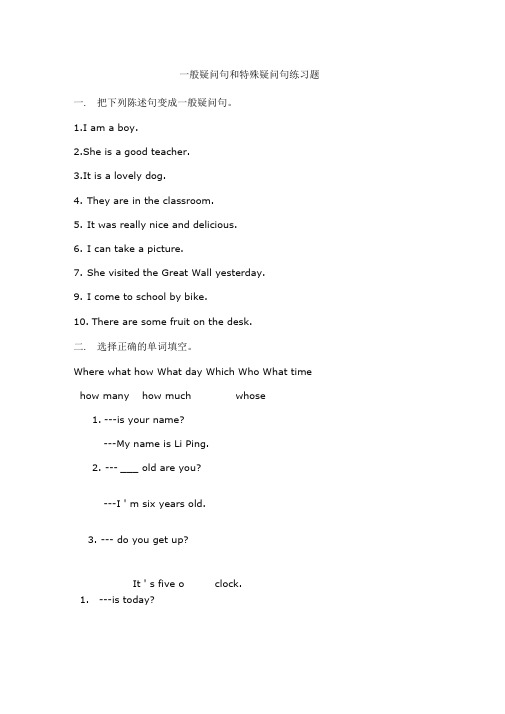
一般疑问句和特殊疑问句练习题一. 把下列陈述句变成一般疑问句。
1.I am a boy.2.She is a good teacher.3.It is a lovely dog.4.They are in the classroom.5.It was really nice and delicious.6.I can take a picture.7.She visited the Great Wall yesterday.9.I come to school by bike.10.There are some fruit on the desk.二. 选择正确的单词填空。
Where what how What day Which Who What time how many how much whose1.---is your name?---My name is Li Ping.2.--- ___ old are you?---I ' m six years old.3.--- do you get up?It ' s five o clock.1.---is today?---Today is Monday. 2.--one do you like best?--I like the black one. 3.—is she?---She is my teacher.4.---are you going?--- I ' m going to the store.5.--- are you!---I ' m fine.6.--- is it?--- It ' s five o ' clock.10. ---do you get here?---By bus.11.---are they?---They are 80 yuan.12.---books do you have?---I have two books13.---room is this?--- It ' s room.三. 对划线部分提问.1.I am going to Shanghai.2.My father will take me to Beijing.3.I went to here by bus.4.We send some beautiful flowers to our teacher.I 一般疑问句和特殊疑问句一.一般疑问句能用Yes或No回答的疑问句叫一般疑问句。
小学一般疑问句和特殊疑问句练习题1

句型练习题一、将以下句子改为一般疑问句.1. His father is an English teacher.2. These cats are crying.3. They can swim.4. I like to read English.5. His father goes to work by bus.6. His birthday is on the twentieth of November.7. Mrs. Li and Kitty are in a big shop.8. The boy under the tree is hungry.9. He goes to school every day.10. She wants a cup of coffee.11. Mrs. Li and Kitty watch television at night.12.I do my homework after school二、就画线部分提问1.He is my father.2.They are under the tree.3.I often watch TV after dinner.4.Lily swims in the swimming pool.(游泳池)5.Superman flies in the sky.6.I often brush my teeth in the evening.7.Alan likes to play with Bill.8.Joe's father plays badminton(羽毛球) every weekend.9.The supermarket is near the school.10.My grandpa took us to the zoo.二.连线:(Match)1. What’s on the chair? A. There is a book in the bag.2. How is your father? B. These are apples.3. What are these? C. I go to school by bus.4. What is in the bag? D. The radio is on the chair.5. How do you go to school? E. My father is fine.6. How much is it? F. I wash my face in the morning.7. What time is it? G. I have two hands.8. When do you wash your face? H. It is fouro’clock.9. How many hands do you have? I. It is 5 RMB(人民币).10.When do you have lunch? J. I have lunch at noon.。
17一般疑问句和特殊疑问句巩固练习

一般疑问句和特殊疑问句【巩固练习】Ⅰ.单项选择。
1.-_____ is your dictionary?-10 Yuan.A. How muchB. How manyC. WhatD. Whose2.-_______ subjects do you have ?-Seven.A. How longB. How manyC. How muchD. How far3.-_______ do you like best?-I like math best.A. Which subjectB. What foodC. What color D.Which sport4. -________ do you like science?-________it’s interesting.A. Why; SoB. What; BecauseC. Why; BecauseD. How; Because5. When _______the girl ________ her homework?A. does; doesB. does; doC. do; doesD. do; do6. —Does he want to go to a movie?— _______.A. Yes, he doesB. No, he doesC. Yes, he doesn’tD. Yes, she is7. -_______ kind of movies do you like?-I like comedies very much.A. What’sB. HowC. WhatD. Why8. -______ are these bananas?-Five dollars.A. What colorB. How aboutC. How muchD. How many9. -Can we play football in the street?-No, you _____. It’s dangerous.A. canB. mustn’tC. mayD. may not10. -_____ does he play football?-In the afternoon.A. WhenB. WhereC. HowD. What【真题链接】1. —_____ is your father? Does he still work as an engineer?—Yes, he has been an engineer for thirty years.(2015安徽中考)A. WhoB. HowC. WhatD. Which2.—_____ does your father go to the fitness center?—He exercises there twice a week.(2015福州中考)A. How soonB. How oftenC. How long3.—_________will the invitations be sent to our guests?(2015广州中考)—In three days.A. How oftenB. How soonC. How longD. How far4.—_____ is it from the New Town to the old city centre?—Less than 30 minutes by underground.(2015无锡中考)A. How soonB. How oftenC. How longD. How farⅡ. 按要求完成句子。
对划线部分提问(一般疑问句和特殊疑问句)练习题-带答案
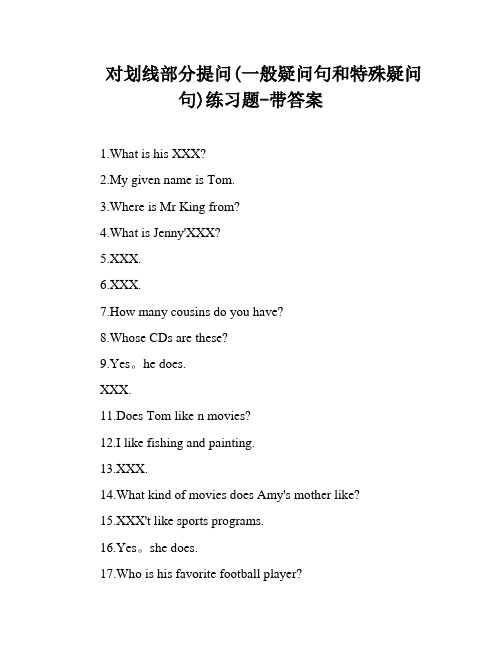
对划线部分提问(一般疑问句和特殊疑问句)练习题-带答案1.What is his XXX?2.My given name is Tom.3.Where is Mr King from?4.What is Jenny'XXX?5.XXX.6.XXX.7.How many cousins do you have?8.Whose CDs are these?9.Yes。
he does.XXX.11.Does Tom like n movies?12.I like fishing and painting.13.XXX.14.What kind of movies does Amy's mother like?15.XXX't like sports programs.16.Yes。
she does.17.Who is his favorite football player?18.prefers。
to19.XXX it?20.How many cousins do you have?21.Where is her backpack?22.How many bathrooms are there in your house?23.Yes。
there is.24.There are three bedrooms and a dining room in my house.25.Are there any books in the bookcase?26.What is opposite the post office?27.Where is the XXX?28.No。
there aren't any parks here.29.XXX?30.The gym is opposite the video store.31.How many hotels are on the street?32.Where is the library XXX?33.Is the museum across from the school?34.Where is the park located?35.There is no desk and chair in the room.36.She is an English teacher at our school.37.How many children do you have。
(完整版)小学一般疑问句和特殊疑问句练习题 (2)
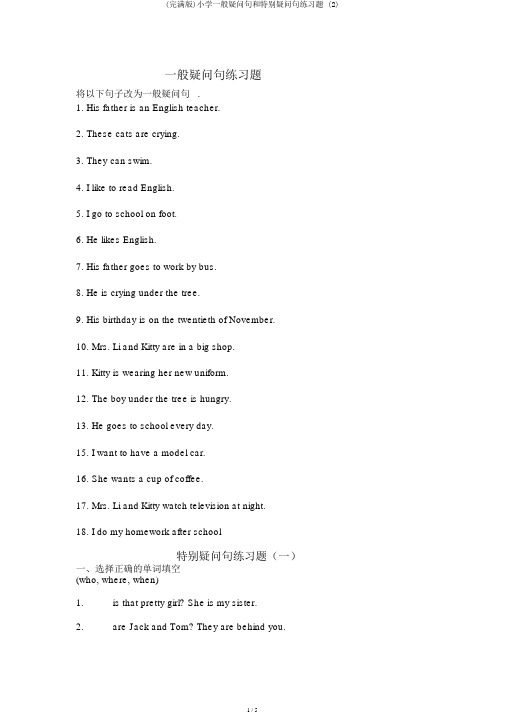
一般疑问句练习题将以下句子改为一般疑问句.1.His father is an English teacher.2.These cats are crying.3.They can swim.4.I like to read English.5.I go to school on foot.6.He likes English.7.His father goes to work by bus.8.He is crying under the tree.9.His birthday is on the twentieth of November.10.Mrs. Li and Kitty are in a big shop.11.Kitty is wearing her new uniform.12.The boy under the tree is hungry.13.He goes to school every day.15.I want to have a model car.16.She wants a cup of coffee.17.Mrs. Li and Kitty watch television at night.18.I do my homework after school特别疑问句练习题(一)一、选择正确的单词填空(who, where, when)1._____ is that pretty girl? She is my sister.2._____ are Jack and Tom? They are behind you.3._____ do you go to school? I go to school from Monday to Friday.4._____ has a beautiful flower? John has a beautiful flower.5._____ are they? They are my parents.6._____ is my mother? She is in the living room.7._____ are you going? We are going to the bakery(面包坊).8._____ do Jim and Wendy play ball? They play ball in the afternoon.9._____ does he jog? He jogs in the park.10._____ are you from? I'm from Changchun city.二、就画线部散提问1.He is my father.2.They are under the tree.3.I often watch TV after dinner.(晚饭后)提示:饭后重申的是时间问题。
- 1、下载文档前请自行甄别文档内容的完整性,平台不提供额外的编辑、内容补充、找答案等附加服务。
- 2、"仅部分预览"的文档,不可在线预览部分如存在完整性等问题,可反馈申请退款(可完整预览的文档不适用该条件!)。
- 3、如文档侵犯您的权益,请联系客服反馈,我们会尽快为您处理(人工客服工作时间:9:00-18:30)。
【巩固练习】Ⅰ.单项选择。
1.-_____ is your dictionary?-10 Yuan.A. How muchB. How manyC. WhatD. Whose2.-_______ subjects do you have ?-Seven.A. How longB. How manyC. How muchD. How far3.-_______ do you like best?-I like math best.A. Which subjectB. What foodC. What color D.Which sport4. -________ do you like science?-________it’s interesting.A. Why; SoB. What; BecauseC. Why; BecauseD. How; Because5. When _______the girl ________ her homework?A. does; doesB. does; doC. do; doesD. do; do6. —Does he want to go to a movie?— _______.A. Yes, he doesB. No, he doesC. Yes, he doesn’tD. Yes, she is7. -_______ kind of movies do you like?-I like comedies very much.A. What’sB. HowC. WhatD. Why8. -______ are these bananas?-Five dollars.A. What colorB. How aboutC. How muchD. How many9. -Can we play football in the street?-No, you _____. It’s dangerous.A. canB. mustn’tC. mayD. may not10. -_____ does he play football?-In the afternoon.A. WhenB. WhereC. HowD. What【真题链接】1. —_____ is your father? Does he still work as an engineer?—Yes, he has been an engineer for thirty years.(2017安徽中考)A. WhoB. HowC. WhatD. Which2.—_____ does your father go to the fitness center?—He exercises there twice a week.(2017福州中考)A. How soonB. How oftenC. How long3.—_________will the invitations be sent to our guests?(2017广州中考)—In three days.A. How oftenB. How soonC. How longD. How far4.—_____ is it from the New Town to the old city centre?—Less than 30 minutes by underground.(2017无锡中考)A. How soonB. How oftenC. How longD. How farⅡ. 按要求完成句子。
1. His favorite subject is art.(就划线部分提问)_______ _______ his favorite subject?2. They like broccoli. (改为一般疑问句)________ they ________ broccoli?3. I like thrillers because it’s scary.(就划线部分提问)________ ________ ________ ________ thrillers?4. My book is on the sofa.(一般疑问句并回答)-________ ________ book on the sofa?-Yes, ______ is. / No, it _______.5. His sister likes to be a musician. (就划线部分提问)________ ________ to be a musician?6. He does his homework after school every day. (改为一般疑问句)_______he _______ his homework after school every day?7. John has P.E. on Monday. (就划线部分提问)________ ________ John have P.E.?8. Mrs. Yang works in a shop. (就划线部分提问)________ does Mrs. Yang _______?9. They are under the bed. (一般疑问句并回答)-_______ _______ under the bed?-Yes, _______ _______. / No, _______ ________.10. My father is OK. (就划线部分提问)________ ________ your father?11. Does she like ice cream? (作否定回答)_________, she _________.12. My bed is yellow. (就划线部分提问)_______ _______ is _______ bed?13. That’s a box. (改为一般疑问句,并作肯定回答)-________ ________ a box?-______, ________ ________.14. The notebook is in the bag.(就划线部分提问)_________ the notebook?15. I can spell that. (改为一般疑问句)________ ________ spell that?【答案与解析】Ⅰ. 单项选择。
1. A。
从对话后面的回答10 yuan可以看出是表示某物的价格,所以前面的句子是用特殊疑问词How much来询问某物的价格是多少。
2. B。
从对话后面的回答和对话句子的意思判断是询问数量多少的,名词subjects是可数名词的复数形式,所以用How many来提问。
3. A。
从对话后面的回答可知是提问某一种科目的,所以用特殊疑问词Which和名词subject 连用来提问。
4. C。
由答语可知,上文问的是“你为什么喜欢自然科学?”;因此第一个空应该填”Why”;回答“Why”的提问时用“Because”引导的句子,表示“因为”。
5. B。
句意:“那个女孩什么时候做家庭作业?”;由此可知本句是对行为动词提问,因此应该加助动词;因为主语是三单,所以用助动词does;用助动词提问时, 谓语动词要还原。
故本题选B。
6. A。
用does 提问还要用does回答,答语前后要一致,故本题选A。
7. C。
从对话后面的回答“我非常喜欢喜剧片”,可以判断对话上面的句子是询问“你喜欢什么种类的电影?”,“特殊疑问词What +kind of+名词……”用来询问“什么种类的……?”。
8. C。
从本句的答语可知,是提问价格的,因此用How much。
9. B。
mustn’t表示“不允许、禁止”。
10. A。
从后面的回答可以判断前面是用When表示“什么时候”的意思。
【真题链接】1. C。
询问职业,用what。
后面的回答是职业,所以选C。
2.B。
由答语“twice a week”可知是问频率,所以选择how often。
3. B。
in+一段时间,常用在一般将来时,对“in+一段时间”提问时,要用How soon,意为“多久”。
4. D。
由题意可知问距离多远,要用how far提问。
Ⅱ. 按要求完成句子。
1. What; is2. Do, like3. Why, do, you, like4. Is, your, it, isn’t5. Who; likes6. Does, do7. When; does8. Where; work9. Are, they, they, are, they, aren’t 10. How, is11. No, she, doesn’t12. What, color, your13. Is, that, Yes, it, is 14. Where’s15. Can, you。
